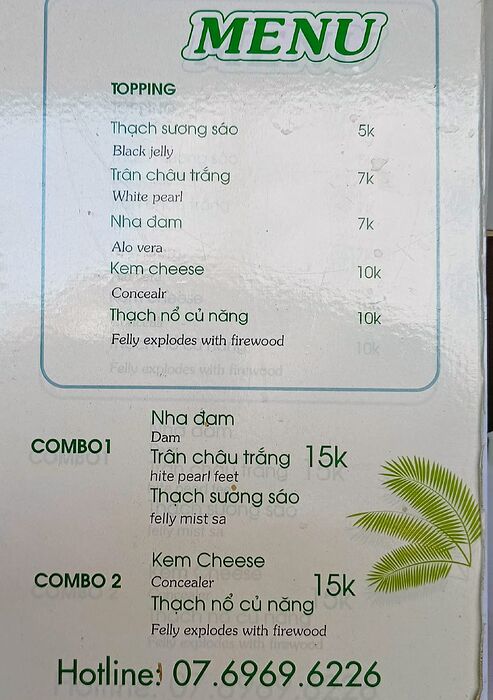??
It should be haricotS verts.
Both the noun and the adjective plural.
How do you feel about ordering pannini and only getting one?
I’d use the extra ‘n’ to add to the toppings ![]()
(post deleted by author)
They’re both correct, however.
I stifle my disappointment … lol
I have more of a problem with “paninis” but I’ve gotten over it. I loved grilled sandwiches and if it’s good, I don’t care what it’s called.
A local Thai place describes its larb as “marinated grounded chicken.”
My partner suggested it got caught out past curfew.
I thought it was just a really practical, sensible bird.
Honestly, you would need a separate thread from the Chinese menus that could fill this up. ![]() And I saw this as an ardent “Engrish” fan of Chinese descent. My sisters and I growing up would always look for those English translation menu fails. Our favorite is from a menu at a local Chinese restaurant decades ago where the vegetarian Buddha’s Delight was printed as Bubba’s Delight. My sisters and I still use this name for that dish today.
And I saw this as an ardent “Engrish” fan of Chinese descent. My sisters and I growing up would always look for those English translation menu fails. Our favorite is from a menu at a local Chinese restaurant decades ago where the vegetarian Buddha’s Delight was printed as Bubba’s Delight. My sisters and I still use this name for that dish today.
I loved that site. I gifted my mom a shirt that said “No smorking” on it, taken from a sign in a Chinese hotel room. She was too embarrassed to wear it (which is unusual for her).
A long time ago, I read an explanation for the way a particular Chinese menu mistranslation gets made. The dish in question was listed as “rabbit fucks the pot”. How the hell does that happen?!
this was the explanation given, from Reddit. The original article, alas, is long gone.
It’s a funny thing about Chinese translations — you see this one -all- over the place, even in China.
The character 干 means dry. So, 干锅 literally means dry-pot, which is a style of pan-frying things before serving.
But 干 also means “do”. And, just like English, you can “do” somebody. Hence, the eventual trail to “fuck”.
What we have not been able to figure out, at all, is how this translation is being made. Every time I run 干锅 through a translator, it gives me “does the pot”. I’ve never seen a dictionary encourage this translation, and there are dozens of sites in Chinese that, when searching for these terms, point out the common mistakes.
And yet it is being made time and time again. Might just have to ask a restaurant owner who does their English translations for them …
Seems like they kinda gave up after “alo vera” and just said fuckit ![]()
One of my SiLs always says “expresso”. Irritating , innit?
Many years back, I went for lunch to a beachside restaurant in Mallorca, where the English language translation of the menu offered “Grill a dried brick pork loin”. Fortunately I have enough Spanish to know I was being offered a pork kebab. And, no, I have no idea how they reached that translation from either Castilian or Mallorquin.
I’m hoping to collect more examples on my upcoming trip to Vietnam.
I had a favourite banh mi stall where there was no menu, but the lady running the stall and I used to do a lot of pointing and mispronounced food item requests. She used to very sweetly pronounce egg as ‘edge’. I’m sure my pronunciation of ‘trung’ (egg in Vietnamese - please excuse the lack of correct diacritical marks) was equally entertaining to her.
The website @kobuta mentioned is an absolute treasure trove.
I’m guessing “brick” should be “cube” or something similar.



